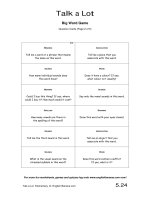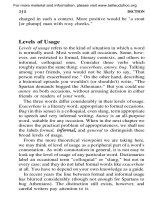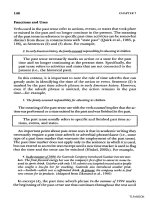Tài liệu Collins cobuild student grammar part 8 docx
Bạn đang xem bản rút gọn của tài liệu. Xem và tải ngay bản đầy đủ của tài liệu tại đây (49.46 KB, 15 trang )
For more material and information, please visit Tai Lieu Du Hoc
at www.tailieuduhoc.org
I cannot go back.
However, if `can' is followed by `not only', `can' and `not' are not joined.
We can not only book your flight for you, but also advise you about hotels.
2 In spoken English and informal written English, `not' is often shortened to `-n't' and added to the modal. The
following modals are often shortened in this way:
could not* couldn't
should not* shouldn't
must not* mustn't
would not* wouldn't
We couldn't leave the farm.
You mustn't talk about Ron like that.
Note the following irregular short forms:
shall not* shan't
will not* won't
cannot* can't
I shan't let you go.
Won't you change your mind?
We can't stop now.
`Might not' and `ought not' are sometimes shortened to `mightn't' and `oughtn't'.
Note that `may not' is very rarely shortened to `mayn't' in modern English.
3 To make a question, you put the modal in front of the subject.
Could you give me an example?
Will you be coming in later?
Shall I shut the door?
Modals are also used in question tags.
See Units 7 and 8 for more information.
4 You never use two modals together. For example, you cannot say `He will can come'. Instead you can say `He
will be able to come'.
I shall have to go.
Your husband might have to give up work.
5 Instead of using modals, you can often use other verbs and expressions to make requests, offers, or
suggestions, to express wishes or intentions, or to show that you are being polite.
For example, `be able to' is used instead of `can', `be likely to' is used instead of `might', and `have to' is used instead of
`must'.
All members are able to claim expenses.
I think that we are likely to see more of this.
These expressions are also used after modals.
I really thought I wouldn't be able to visit you this week.
6 `Dare' and `need' sometimes behave like modals.
For more material and information, please visit Tai Lieu Du Hoc
at www.tailieuduhoc.org
See Unit 72 for information on `dare' and Units 71 and 90 for information on `need'.
Unit 81 Possibility
Main points
* You use `can' to say that something is possible.
* You use `could',`might', and `may' to indicate that you are not certain whether something is possible, but you
think it is.
1 When you want to say that something is possible, you use `can'.
Cooking can be a real pleasure.
In some cases this can cause difficulty.
You use `cannot' or `can't' to say that something is not possible.
This cannot be the answer.
You can't be serious.
2 When you want to indicate that you are not certain whether something is possible, but you think it is, you use
`could', `might', or `may'. There is no important difference in meaning between these modals, but `may' is slightly more formal.
That could be one reason.
He might come.
They may help us.
You can also use `might not' or `may not' in this way.
He might not be in England at all.
They may not get a house with central heating.
Note that `could not' normally refers to ability in the past. See Unit 83.
3 When there is a possibility that something happened in the past, but you are not certain if it actually happened,
you use `could have', `may have', or `might have', followed by a past participle.
It could have been tomato soup.
You may have noticed this advertisement.
You can also use `might not have' or `may not have' in this way.
He might not have seen me.
They may not have done it.
You use `could not have' when you want to indicate that it is not possible that something happened.
He didn't have a boat, so he couldn't have rowed away.
It couldn't have been wrong.
You also use `could have' to say that there was a possibility of something happening in the past, but it did not happen.
It could have been awful. (But it wasn't awful.)
You could have got a job last year. (But you didn't get a job.)
4 You also use `might have' or `could have' followed by a past participle to say that if a particular thing had
happened, then there was a possibility of something else happening.
She said it might have been all right, if the weather had been good. (But the weather wasn't good, so it wasn't all
right.)
If I'd been there, I could have helped you. (But I wasn't there, so I couldn't help you.)
5 `Be able to', `not be able to', and `be unable to' are sometimes used instead of `can' and `cannot', for example
after another modal, or when you want to use a `to'-infinitive, an `-ing' form, or a past participle.
For more material and information, please visit Tai Lieu Du Hoc
at www.tailieuduhoc.org
When will I be able to pick them up?
He had been unable to get a ticket.
6 You use `used to be able to' to say that something was possible in the past, but is not possible now.
Everyone used to be able to have free eye tests.
You used to be able to buy cigarettes in packs of five.
7 Note that you also use `could' followed by a negative word and the comparative form of an adjective to
emphasize a quality that someone or something has. For example, if you say `I couldn't be happier', you mean that you are very
happy indeed and cannot imagine being happier than you are now.
You couldn't be more wrong.
He could hardly have felt more ashamed of himself.
Unit 82 Probability and certainty
Main points
* You use `must', `ought', `should', or `will' to express probability or certainty.
* You use `cannot' or `can't' as the negative of `must', rather than `must not' or `mustn't', to say that something
is not probable or is not certain.
1 When you want to say that something is probably true or that it will probably happen, you use `should' or
`ought'. `Should' is followed by the base form of a verb. `Ought' is followed by a `to'-infinitive.
We should arrive by dinner time.
She ought to know.
When you want to say that you think something is probably not true or that it will probably not happen, you use `should
not' or `ought not'.
There shouldn't be any problem.
That ought not to be too difficult.
2 When you want to say that you are fairly sure that something has happened, you use `should have' or `ought to
have', followed by a past participle.
You should have heard by now that I'm leaving.
They ought to have arrived yesterday.
When you want to say that you do not think that something has happened, you use `should not have' or `ought not to
have', followed by a past participle.
You shouldn't have had any difficulty in getting there.
This ought not to have been a problem.
3 You also use `should have' or `ought to have' to say that you expected something to happen, but that it did not
happen.
Yesterday should have been the start of the soccer season.
She ought to have been home by now.
Note that you do not normally use the negative forms with this meaning.
4 When you are fairly sure that something is the case, you use `must'.
Oh, you must be Sylvia's husband.
He must know something about it.
If you are fairly sure that something is not the case, you use `cannot' or `can't'.
This cannot be the whole story.
He can't be very old - he's about 25, isn't he?
For more material and information, please visit Tai Lieu Du Hoc
at www.tailieuduhoc.org
WARNING: You do not use `must not' or `mustn't' with this meaning.
5 When you want to say that you are almost certain that something has happened, you use `must have', followed
by a past participle.
This article must have been written by a woman.
We must have taken the wrong road.
To say that you do not think that something has happened, you use `can't have', followed by a past participle.
You can't have forgotten me.
He can't have said that.
6 You use `will' or `-'ll' to say that something is certain to happen in the future.
People will always say the things you want to hear.
They'll manage.
You use `will not' or `won't' to say that something is certain not to happen.
You won't get much sympathy from them.
7 There are several ways of talking about probability and certainty without using modals. For example, you can
use:
* `bound to' followed by the base form of a verb
It was bound to happen.
You're bound to make a mistake.
* an adjective such as `certain', `likely', `sure', or `unlikely', followed by a `to'-infinitive clause or a `that'-clause
They were certain that you were defeated.
I am not likely to forget it.
See Unit 33 for more information on these adjectives.
Unit 83 Ability
Main points
* You use `can' to talk about ability in the present and in the future.
* You use `could' to talk about ability in the past.
* You use `be able to' to talk about ability in the present, future, and past.
1 You use `can' to say that someone has the ability to do something.
You can all read and write.
Anybody can become a qualified teacher.
You use `cannot' or `can't' to say that they do not have the ability to do something.
He cannot dance.
2 When you want to talk about someone's ability in the past as a result of a skill they had or did not have, you use
`could', `could not', or `couldn't'.
He could run faster than anyone else.
A lot of them couldn't read or write.
3 You also use `be able to', `not be able to', and `be unable to' to talk about someone's ability to do something,
but `can' and `could' are more common.
She was able to tie her own shoelaces.
They are not able to run very fast.
For more material and information, please visit Tai Lieu Du Hoc
at www.tailieuduhoc.org
Many people were unable to read or write.
4 You use `was able to' and `were able to' to say that someone managed to do something in a particular situation
in the past.
After treatment he was able to return to work.
The farmers were able to pay the new wages.
We were able to find time to discuss it.
WARNING: You do not normally use `could' to say that someone managed to do something in a particular situation.
However, you can use `could not' or `couldn't' to say that someone did not manage to do something in a particular situation.
We couldn't stop laughing.
I just couldn't think of anything to say.
5 When you want to say that someone had the ability to do something in the past, but did not do it, you use
`could have' followed by a past participle.
You could have given it all to me.
You know, she could have done French.
You often use this form when you want to express disapproval about something that was not done.
You could have been a little bit tidier.
You could have told me!
6 You use `could not have' or `couldn't have' followed by a past participle to say that it is not possible that
someone had the ability to do something.
I couldn't have gone with you, because I was in London at the time.
She couldn't have taken the car, because Jim was using it.
7 In most cases, you can choose to use `can' or `be able to'. However, you sometimes have to use `be able to'.
You have to use `be able to' if you are using another modal, or if you want to use an `-ing' form, a past participle, or a `to'-infinitive.
Nobody else will be able to read it.
...the satisfaction of being able to do the job.
I don't think I'd have been able to get an answer.
You're foolish to expect to be able to do that.
8 You also use `can' or `could' with verbs such as `see', `hear', and `smell' to say that someone is or was aware
of something through one of their senses.
I can smell gas.
I can't see her.
I could see a few stars in the sky.
There was such a noise we couldn't hear.
Unit 84 Permission
Main points
* You use `can' or `be allowed to' to talk about whether someone has permission to do something or not.
* You usually use `can' to give someone permission to do something.
* You usually use `can' or `could' to ask for permission to do something.
1 You use `can' to say that someone is allowed to do something. You use `cannot' or `can't' to say that they are
not allowed to do it.
Students can take a year away from university.
Children cannot bathe except in the presence of two lifesavers.
For more material and information, please visit Tai Lieu Du Hoc
at www.tailieuduhoc.org
You use `could' to say that someone was allowed to do something in the past. You use `could not' or `couldn't' to say that
they were not allowed to do it.
We could go to any part of the island we wanted.
Both students and staff could use the swimming pool.
We couldn't go into the library after 5 pm.
2 You also use `be allowed to' when you are talking about permission, but not when you are asking for it or giving
it.
When Mr Wilt asks for a solicitor he will be allowed to see one.
It was only after several months that I was allowed to visit her.
You're not allowed to use calculators in exams.
3 In more formal situations, `may' is used to say that someone is allowed to do something, and `may not' is used
to say that they are not allowed to do it.
They may do exactly as they like.
The retailer may not sell that book below the publisher's price.
4 When you want to give someone permission to do something, you use `can'.
You can borrow that pen if you want to.
You can go off duty now.
She can go with you.
`May' is also used to give permission, but this is more formal.
You may speak.
You may leave as soon as you have finished.
5 When you want to refuse someone permission to do something, you use `cannot', `can't', `will not', `won't',
`shall not', or `shan't'.
`Can I have some sweets?' - `No, you can't!'
`I'll just go upstairs.' - `You will not!'
You shan't leave without my permission.
6 When you are asking for permission to do something, you use `can' or `could'. If you ask in a very simple and
direct way, you use `can'.
Can I ask a question?
Can we have something to wipe our hands on please?
`Could' is more polite than `can'.
Could I just interrupt a minute?
Could we put this fire on?
`May' is also used to ask permission, but this is more formal.
May I have a cigarette?
`Might' is rather old-fashioned and is not often used in modern English in this way.
Might I inquire if you are the owner?
7 You have to use `be allowed to' instead of a modal if you are using another modal, or if you want to use an `-
ing' form, a past participle, or a `to'-infinitive.
Teachers will be allowed to decide for themselves.
I am strongly in favour of people being allowed to put on plays.
They have not been allowed to come.
We were going to be allowed to travel on the trains.
Unit 85 Instructions and requests
Main points









